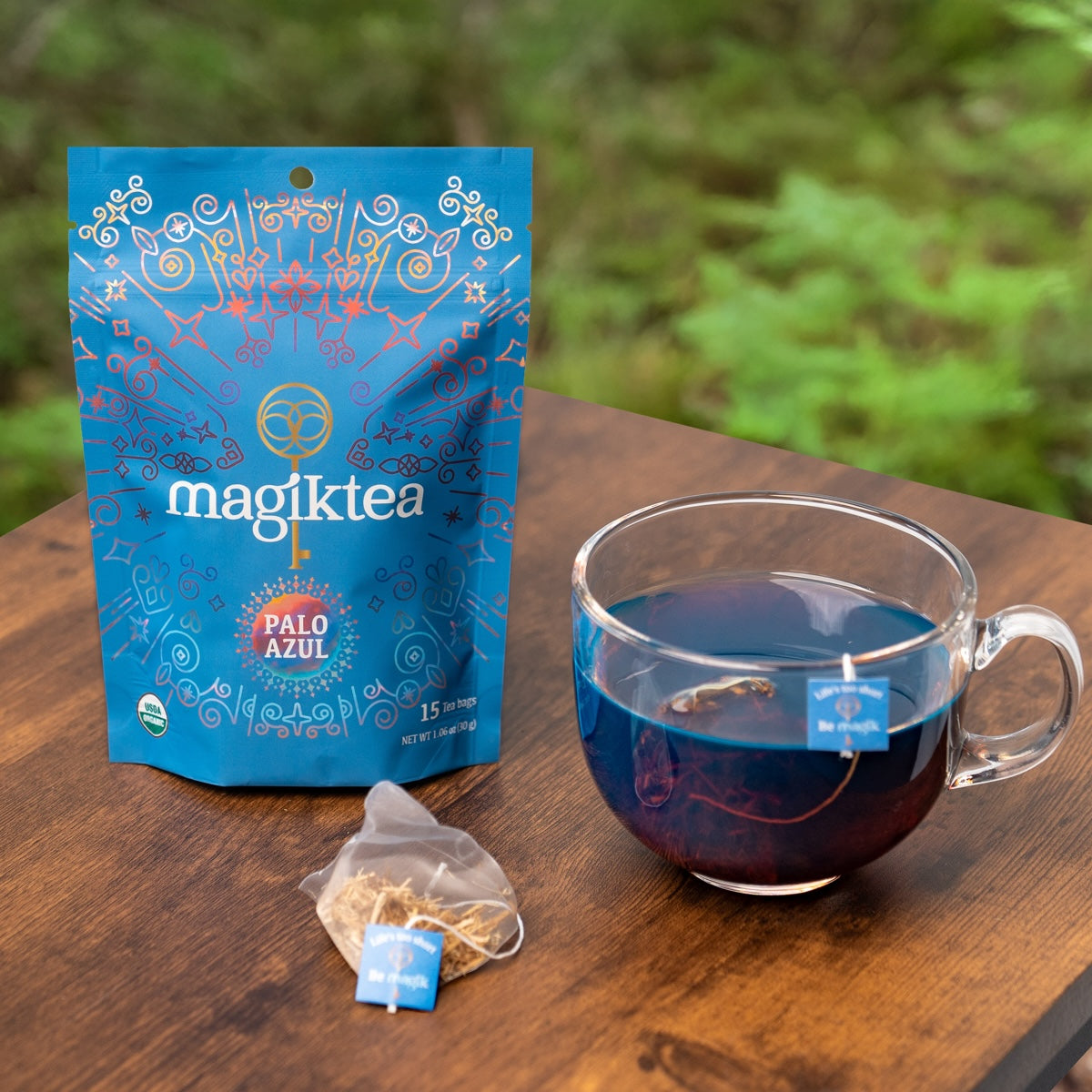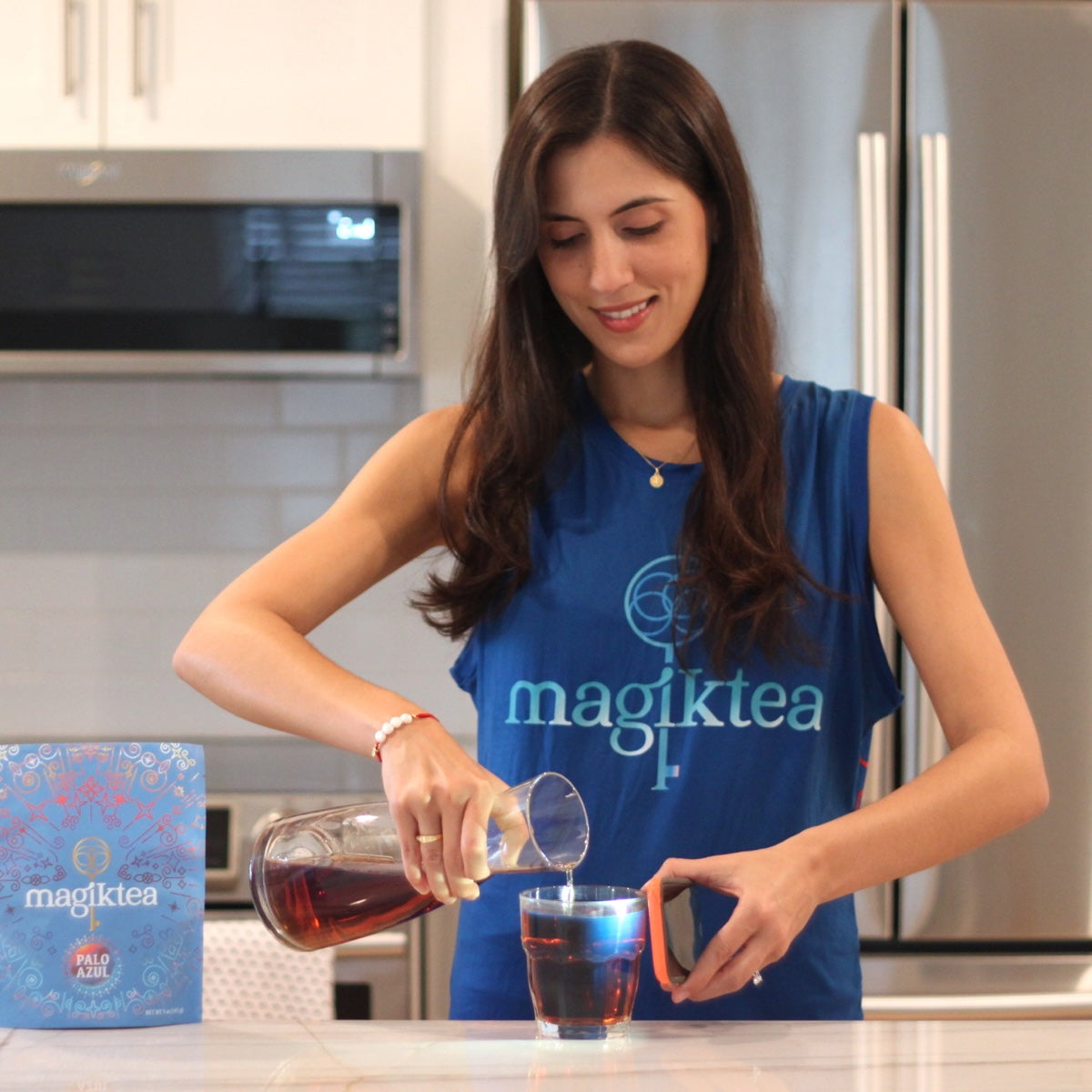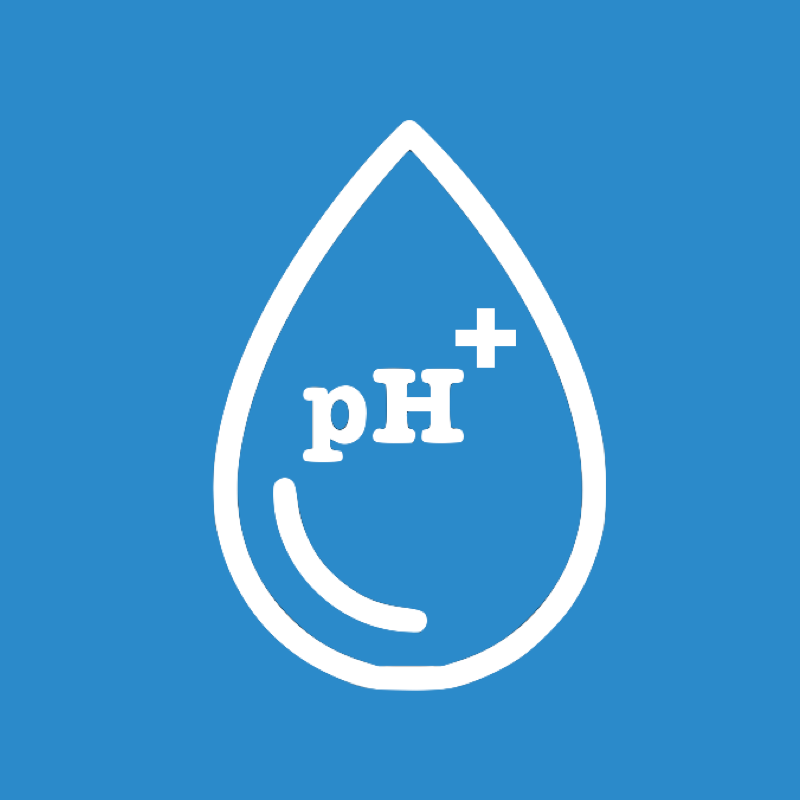Great For Detoxing At All Times
One of the things we love about palo azul (other than its beautiful fluorescence) is that it's caffeine-free, so we get to enjoy the same beneficial properties of green tea throughout the entire day! This make palo azul a great option for detoxing later in the day if you consume processed foods or alcohol because it inhibits oxidative stress, inflammation, free radicals, and lipid peroxidation (1).
Caffeine can actually be healthy when consumed in moderation. But just like everything in life, when consumed in excess, it may have some serious negative side effects including insomnia and anxiety.
Coffee has been antagonized by several companies who claim to have created replacement beverages with less caffeine which are supposed to be “better for you” because they don’t cause the jitters, anxiety and crash that comes with a good ol’ cup of joe. But is caffeine really that bad for you? Let’s find out.
Firstly, what is caffeine?

Caffeine is an alkaloid that stimulates the brain by blocking adenosine receptors. Mathew Walker, the author of Why We Sleep, explains that adenosine is like sleep pressure that builds up throughout the day. The more pressure, the sleepier you feel. And when we sleep, the brain removes all that adenosine so we wake up feeling alert and refreshed.
Walker explains that "caffeine essentially hijacks the adenosine receptors and prevents the signal of adenosine from telling your brain that you’re sleepy. It essentially hits the mute button on adenosine, so it fools ur brain into thinking you haven’t been awake for 12 hours. BUT….that adenosine is still building up, so once you metabolize all the caffeine, you will have a crash from all the adenosine buildup and you’re hit with a huge wave of sleepiness, then you have to have an even stronger cup of coffee to get over that sleepiness. So, we don’t receive the full benefits of deep sleep because we have too much caffeine in our system.”
To illustrate how critical deep sleep is for our health, Walker mentions that after daylight savings, “when we lose 1 hour of sleep, we see a 24% increase in relative heart attack rates the following day. Yet when we gain an hour of sleep, we see a 21% reduction in heart attacks.”
How much is too much caffeine?
The USDA suggests that a daily intake of under 400 mg of caffeine (2-4 cups of coffee) is safe. Most of the studies found that the recommended daily intake is around 200 mg.
Benefits
1. Boosts Metabolism

One study found that “caffeine may increase metabolism by up to 11% and fat burning by up to 13%” and that it “may increase the use of fat as fuel” during exercise. Another study mentions that “caffeine has also been recently linked to weight loss and consequent reduction of the overall risks for developing the metabolic syndrome.”
WebMD wrote an article which mentions that 1 cup of coffee led to a “3-4% increase in metabolic rate” which increases the number of calories burned.
2. Athletic Performance

A study found that “caffeine increases production of plasma catecholamines that allow the body to adapt to the stress created by physical exercise...thus allowing glycogen sparing.” This essentially means that caffeine is “able to improve physical performance and endurance during prolonged activity of submaximal intensity” because glycogen sparing can prolong the time it takes for muscles to get exhausted.
We had never heard of this before but apparently it’s legit! Another study found that performance benefits attributed to caffeine include physical endurance, reduction of fatigue, and enhancing mental alertness and concentration. A 2005 study also found that “in comparison to placebo, caffeine reduced RPE (rating of perceived exertion) during exercise by 5.6%” which means that it decreased muscle exhaustion.
Lastly, a 2015 study found that “caffeine augmented resistance exercise performance (total repetitions, volume load) without increasing blood lactate” and concluded the following: “The addition of caffeine increased mean power and velocity of squat performance. These results indicate supplementation with caffeine can enhance local muscle endurance during resistance exercise.”
This basically means that...Workout + Coffee = More gains!
Side Effects
1. Disrupts Sleep Quality

A 2016 study says that “the data suggests that shorter sleep is associated with greater caffeine consumption.” Another study recommends not consuming caffeine at least 6 hours prior to sleep because they found that “caffeine taken 6 hours before bedtime has important disruptive effects on sleep.”
The Mayo Clinic also mentions that caffeine taken in the afternoon can interfere with your sleep, which can affect your alertness the next day...causing you to drink more caffeine to stay alert and further affecting your sleep in a vicious cycle.
This claim is supported by a 2008 clinical review which mentions that “population-based studies indicate that regular daily dietary caffeine intake is associated with disturbed sleep and associated daytime sleepiness.”
But in case you’re anything like the NAVY SEALs and you’re in situations of sleep deprivation...a study randomly assigned 100-400 mg caffeine or a placebo to SEAL trainees after 72 hours of sleep deprivation and found that “200-300 mg caffeine significantly improved visual vigilance, choice reaction time, repeated acquisition, self-reported fatigue and sleepiness with the greatest effects on tests of vigilance, reaction time, and alertness.
2. Anxiety

Although caffeine’s stimulatory effects are beneficial for alertness and focus, Healthline mentions higher doses of caffeine can “lead to anxiety and nervousness. Extremely high daily intakes of 1,000 mg or more per day have been reported to cause nervousness, jitteriness and similar symptoms in most people.
A 2015 review found that consuming over 400 mg of caffeine per day led to the following side effects: a fast heartbeat, anxiety, agitation, restlessness, sleeping problems, tremors. This is supported by another study which found that “caffeine increased anxiety, depression, and hostility.” Lastly, a cross sectional study of 4558 Australians found “that the proportion of subjects reporting indigestion, palpitations, tremor, headache and insomnia increased significantly with mean caffeine intake.”
3. Recommended to Limit While Pregnant

The American College of Obstetricians and Gynecologists, recommends that “pregnant women should limit their daily intake to 200 mg.” The Mayo Clinic also wrote an article which recommends that pregnant women and those who are breast feeding should limit their daily caffeine intake to 200 mg.
4. Excessive Urination

One study found that “caffeine at 4.5 mg/kg caused diuresis” (urination). The authors also mention that “caffeine can promote early urgency and frequency of urination” and they recommend that “individuals with lower urinary tract symptoms should avoid or be cautious in consuming caffeine.”
Another study found that caffeine consumption “is associated with a modest increase in incidence of frequent urgency incontinence” (loss of bladder control). If you feel like you have to go #1 too much, try cutting back on caffeine and see if it helps.
5. Addiction

The Healthline article mentions that although caffeine triggers certain brain chemicals similarly to the way cocaine and amphetamines do, it does not cause classic addiction the way these drugs do. One study found that “daily users had greater increases in headaches, fatigue and other withdrawal symptoms than non-daily users.” WebMD mentions that “failing to consume caffeine one day can lead to withdrawal symptoms like headaches.”
Medical News Today wrote an article which says that “caffeine activates many of the same behavioral and neuropharmacological mechanisms that are activated by other drugs of abuse. For this reason, a small percentage of the population develops caffeine use disorder.” They also mention that “some people could become physically dependent on caffeine” and withdrawal symptoms could include “headache, tiredness, reduced energy and alertness, sleepiness, low mood, concentration problems, irritability.”
While caffeine isn’t as addictive as some illegal drugs, it certainly is addictive both physically and psychologically as demonstrated from the withdrawal effects it can have on the body. One way to combat this is by ridding yourself of caffeine dependency by not drinking caffeine everyday. Try it out for a few days and perhaps you’ll find that you’ll be just fine without caffeine.
Conclusion
In summary, 100-200 mg caffeine per day (1-2 cups of coffee) may have some beneficial effects and most of the negative side effects are only caused by excessive consumption of caffeine (400 mg+). So you don’t have to feel bad about drinking coffee (as long as it’s not loaded with refined sugar)! The key is to have balance and moderation, when you need a break from caffeine...drink some magik!
Sources
(2021) Coffee and Arterial Hypertension
(2014) Exercise and Sport Performance with Low Doses of Caffeine
(2004) Metabolic effects of caffeine in humans: lipid oxidation or futile cycling?
Caffeine and sports activity: a review
Healthline: What Is Caffeine, and Is It Good or Bad for Health?
(2013) Coffee consumption and cardiovascular health: getting to the heart of the matter
(2009) Side effects of caffeine
(1999) Coffee, caffeine and blood pressure: a critical review
(2011) Genetic determinants of blood pressure responses to caffeine drinking
(1992) [Cardiovascular effects of everyday coffee consumption]
(1988) Effects of caffeine on blood pressure
(2008) Acute and long-term cardiovascular effects of coffee: implications for coronary heart disease
Healthline: 9 Side Effects of Too Much Caffeine
(2016) Caffeine Consumption and Sleep Quality in Australian Adults
(2013) Caffeine Effects on Sleep Taken 0, 3, or 6 Hours before Going to Bed
(2009) Gastroesophageal Reflux Disease: A Population Based Study
(2009) Gastroesophageal Reflux Disease: A Population Based Study
(2006) Effect of caffeine on lower esophageal sphincter pressure in Thai healthy volunteers
(2016) A remarkable case of rhabdomyolysis associated with ingestion of energy drink 'neon volt'
(2007) Caffeine overdose with rhabdomyolysis and hypokalaemia
(2014) Rhabdomyolysis induced by excessive coffee drinking
(2011) Effect of caffeine on bladder function in patients with overactive bladder symptoms
(2011) Caffeine intake and risk of stress, urgency, and mixed urinary incontinence
Mayo Clinic: Caffeine: How much is too much?
WebMD: Caffeine: Are There Health Benefits?
Medical News Today: Is caffeine bad for you?
(2008) Caffeine: Sleep and daytime sleepiness
(1984) Effects of caffeine on anxiety and depression
(1994) Caffeine Effects on Learning, Performance, and Anxiety in Normal School-Age Children






